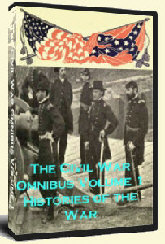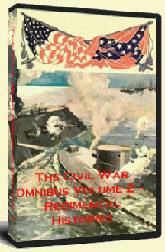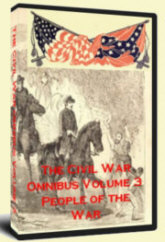The Civil War began as an exercise of patriotism. The new Confederacy had no army to speak of, and hence had to depend on volunteers. The Federal Army was woefully undermanned, and President Abraham Lincoln issued a request for volunteers as soon as it was determined that war was inevitable. These volunteers were ready to fight for their country, but after a space of months – or even weeks in some cases – they were ready to leave the fighting to other men and return to their homes. The shortage of manpower on both sides meant that the first drafts in America’s short history were instituted.
The involuntary conscription of men into the Army seemed to fly in the face of the very tenets that the Constitution was based upon – liberty and the pursuit of happiness certainly didn’t go hand in hand with a draft. However in both the Union and the Confederacy, civil war also meant a suspension of civil liberties for men of an age to fight. Read the rest of this entry »
Comments Off on Rich Man’s War, Poor Man’s Fight – The Draft and the Civil War
For soldiers on the march during the Civil War, fresh food was often a delicacy that had to be obtained by less than honest means. Yet Confederate General Robert E. Lee was guaranteed one fresh egg every day, but this honor was not due to the fact that Lee was the commanding general of the Confederate Army; rather, it was because Lee had befriended a hen who traveled along with him, gifting him with an egg she laid under his cot every morning. When his pet hen was lost during the Battle of Gettysburg, Lee and the rest of his men were highly distressed until she could be found.
Lee’s pet hen was the rule rather than the exception; many Civil War regiments took animals along as mascots or pets. Dogs, cats, donkeys, even camels, bears, eagles and pelicans traveled along with Union and Confederate armies into the thick of battle, providing companionship, comfort, and entertainment along the way. Read the rest of this entry »
Comments Off on Bless the Beasts – Animals of the Civil War
“It’s all a damned mess! And our two armies ain’t nothing but howling mobs!”
– A captured Confederate private gave this description of the Battle of the Wilderness in 1864.
By 1864 it was clear that General Robert E. Lee and his Army of Northern Virginia were a major obstacle that stood between the Union and the Confederacy. While the war was beginning to turn in the Union’s favor on other fronts, Lee and his men had held fast, consistently emerging victorious even when vastly outnumbered by a larger, better supplied Union Army.
Union General Ulysses S. Grant recognized that in order to defeat the Confederacy, he’d have to go through Lee and Northern Virginia. In the spring of 1864, Grant undertook the Overland Campaign, a campaign intended to decimate Lee’s Army of Northern Virginia, and eventually take the Confederate capitol of Richmond. Read the rest of this entry »
Comments Off on The Battle of the Wilderness
Relieved of his command of the V Corps after the debacle at Second Bull Run, Fitz John Porter was demoted, while the disgraced General Pope was sent to Minnesota to put down the Dakota Uprising. However, Pope kept up with his powerful friends in Washington – friends that included President Lincoln – a correspondence that would soon prove fruitful.
McClellan’s plans to fortify Washington by launching a Maryland Campaign in 1862, one that would decimate Lee were not met with confidence in the capitol. Members of Congress circulated a petition stating “our deliberate opinion that, at this time, it is not safe to entrust to Major General McClellan the command of any Army of the United States.” President Lincoln, with whom McClellan had an ongoing antagonistic relationship, due possibly to the fact that McClellan had repeatedly referred publicly to Lincoln as one of several members of the simian family, had only with reluctance entrusted McClellan with the task. Read the rest of this entry »
A disgraced general. An unpopular and perhaps unqualified general. A disgruntled general. Muddled orders. An embarrassing rout on the battlefield. An eventual court-martial. All the ingredients for a military scandal. All the ingredients of the court-martial of Fitz John Porter.
The court-martial of Fitz John Porter during the Civil War is largely forgotten today, but at the time, it was one of the most sensational trials of the 19th century, and the matter was still being debated – and eventually decided – long after the last shots of the war were fired.
Fitz John Porter was a major general in the Union army, with a long and distinguished military record. After the beginning of the Civil War, Porter moved quickly up the ranks in the U.S. Army, finally landing as a major general in the Army of the Potomac under the command of his good friend General George McClellan. McClellan gave Porter command of one of the Corps of the Army of the Potomac, the V Corps. Read the rest of this entry »
Comments Off on The Court-Martial of Fitz John Porter, Part 1


